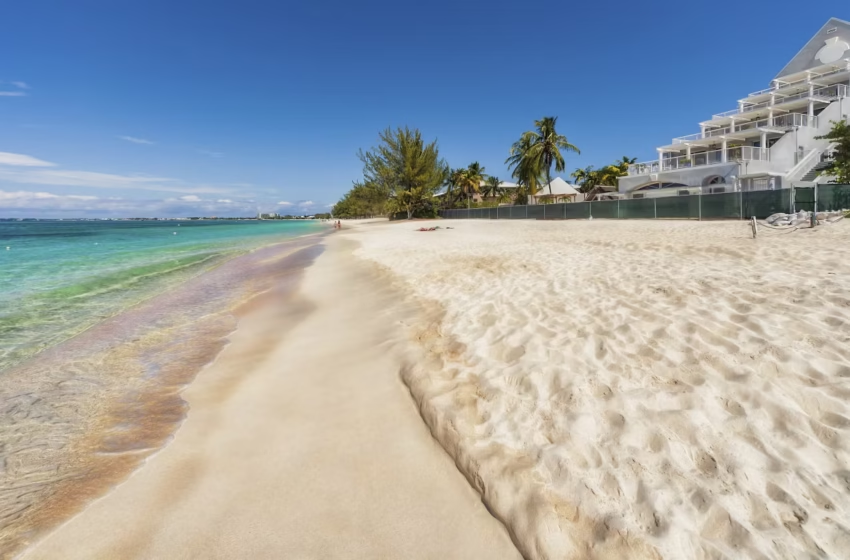The history Cayman Islands as a British overseas territory

Cayman Island (Image from British Airways)
The second destination in our series on the stories of Britain’s overseas territories takes us to the sun-soaked shores of the Cayman Islands. Before you book that flight or imagine the turquoise waters, have you ever wondered why this Caribbean paradise is still called a British Overseas Territory? Here’s the story of how the Cayman Islands came under British rule and what that means today
Nestled in the shimmering turquoise waters of the Caribbean, the Cayman Islands – Grand Cayman, Cayman Brac, and Little Cayman – are a captivating trio. More than just a sun-drenched paradise, these islands boast a rich history and a unique relationship with the United Kingdom, their colonial past deeply interwoven with their present status as a British Overseas Territory. To understand the Cayman Islands today is to embark on a journey through centuries of exploration, settlement, and evolving ties with the Mother Country.
Echoes of the Past: Discovery and Early Settlement
Our story begins in 1503 when Christopher Columbus, on his fourth and final voyage to the New World, stumbled upon the smaller islands of Cayman Brac and Little Cayman. He christened them “Las Tortugas” due to the abundance of sea turtles, a name that would later evolve to “Caymanas” after the indigenous Carib word for the marine crocodile, a creature once prevalent in the islands’ waters.
For over a century, the islands remained largely uninhabited, serving primarily as a stopover for buccaneers and privateers who sought refuge and provisions. Their strategic location in the western Caribbean made them an ideal hideout for those engaged in the lucrative, albeit illicit, trade that dominated the seas. It wasn’t until the mid-17th century that permanent settlement began to take root, with the first recorded settlers arriving from Jamaica in the 1660s. These early pioneers, a mix of British, African, and European backgrounds, laid the foundations of Caymanian society, largely drawn by the promise of fertile land and the bounty of the sea.
The British Embrace: From Colony to Territory
Jamaica, a British colony since 1655, played a pivotal role in the early development of the Cayman Islands. As a dependency of Jamaica, the islands were informally administered, their affairs overseen by Jamaican governors. However, the formalisation of their relationship with Britain truly began in 1670 with the Treaty of Madrid. This treaty saw Spain formally cede Jamaica and its dependencies, including the Cayman Islands, to England. From this point forward, the Cayman Islands were unequivocally under British dominion.
Despite their British affiliation, the islands largely operated with a degree of self-governance due to their remote location and small population. Early settlers, many of whom were shipwrecked sailors, deserters, and even pirates seeking a new life, developed a resilient and independent spirit. They built a society based on hard work, a deep connection to the sea – primarily through turtling and fishing – and a strong sense of community.
The formal separation from Jamaica came in 1962 when Jamaica gained its independence. The people of the Cayman Islands, through a decision made by their legislative assembly, opted to remain a British colony. This pivotal moment solidified their status as a British Overseas Territory, a decision that reflected a desire for continued stability, the perceived benefits of British legal and political frameworks, and a strong sense of historical and cultural ties.

A Distinct Caymanian Culture: A Blend of Influences
The unique history of the Cayman Islands has forged a distinct culture, a fascinating blend of British tradition and Caribbean vibrancy. While British common law forms the bedrock of their legal system, and parliamentary democracy shapes their governance, the islands retain their own flavour.
Language: English is the official language, spoken with a charming Caymanian lilt, a testament to their British heritage.
Religion: Protestantism, particularly Presbyterianism and Anglicanism, holds a significant place in Caymanian society, reflecting the strong influence of early missionaries and settlers.
Cuisine: Caymanian cuisine is a delightful fusion of fresh seafood, local produce, and traditional Caribbean spices. Dishes like conch stew, fish rundown, and heavy cake are staples, showcasing their seafaring roots and agricultural heritage.
Traditions: Festivals like Pirates Week, a vibrant celebration of the islands’ buccaneering past, and agricultural shows that highlight their rural traditions, demonstrate a proud preservation of their unique identity. The national motto, “He hath founded it upon the seas,” beautifully encapsulates their enduring connection to the ocean.
Read Also: Gibraltar: British overseas territory – history, culture and everything you need to know
The Modern Relationship: Partnership and Progress
Today, the relationship between the Cayman Islands and the UK is one of mutual respect and partnership. As a British Overseas Territory, the Cayman Islands enjoy a significant degree of self-governance, with their own elected Parliament, Premier, and judicial system. The UK retains responsibility for defence, external affairs, and internal security, ensuring the islands’ stability and international standing.
This relationship has provided the Cayman Islands with a robust legal framework, a stable political environment, and access to international markets, all of which have contributed to their remarkable economic success. The islands have transformed into a leading global financial centre and a premier tourist destination, drawing visitors and investors from around the world.
The bond is also evident in the frequent visits by members of the British Royal Family, diplomatic exchanges, and shared cultural events. Caymanians hold British passports, and many pursue higher education in the UK, further strengthening the ties between the two.
What One Needs to Know
For anyone considering a visit, investment, or even a deeper understanding of the Cayman Islands, here are some key takeaways:
- Political Stability: The islands benefit from a stable democratic system and a strong legal framework underpinned by British common law.
- Economic Hub: They are a major international financial centre, known for their tax-neutral environment and robust regulatory framework. Tourism is also a significant pillar of their economy.
- Beautiful Environment: Pristine beaches, vibrant coral reefs, and diverse marine life make them a paradise for nature lovers and water sports enthusiasts.
- Friendly Culture: Caymanians are renowned for their hospitality and welcoming nature, offering a warm embrace to visitors.
- British Influence: While uniquely Caymanian, the British influence is evident in their institutions, language, and certain cultural nuances.
In conclusion, the Cayman Islands are far more than just a tropical escape. They are a living testament to a rich and complex history, a vibrant culture born from diverse influences, and an enduring relationship with the United Kingdom. This British gem in the Caribbean continues to thrive, balancing its heritage with modern aspirations, and offering a compelling story to all who seek to understand its charm.


